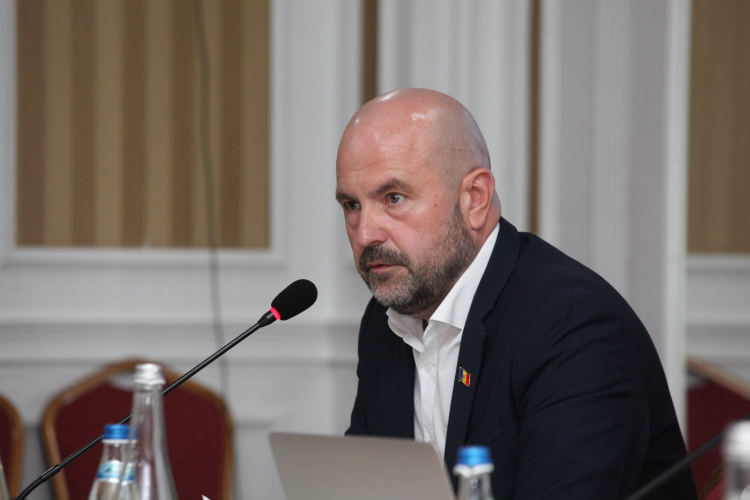
Moldovan infrastructure minister says interurban passenger transport rates not to be increased
The interurban passenger transport rates will not be increased, categorically, at present. We are not discussing it. As of now, the answer is no. Deputy Prime Minister, Minister of Infrastructure and Regional Development Vladimir Bolea today made statements to this effect at a broadcast on the public station, Radio Moldova.
“The government, Ministry of Infrastructure and Regional Development (MIDR), must find a balance in the infrastructure sector. On the one hand, we have economic agents, where our drivers, our citizens work, who transport passengers, who are also our citizens. On the one hand, there are the transporters who want to increase prices to earn as much as possible, and it is absolutely normal to want to earn as much as possible, and on the other hand, we have citizens with limited financial resources. Or we, through our policies, of the competent ministry, should consider both sides. This balance must always be maintained,” Vladimir Bolea said.
The deputy PM said that everyone needs to live. “Yes, we understand that diesel prices have changed, repairs, and tires have changed, the level of expenses is totally different, but, at the same time, you have to demonstrate any figure that you put in the calculation methodology,” Bolea noted.
In early last March, the authorities sternly responded to the transporters who threatened protests: Changes must be made for the people, not for the interests of certain groups
At that time, the Ministry of Infrastructure and Regional Development issued a response to the Employers' Association of Road Transport Operators (APOTA), which had previously announced protests by the transporters.
MIDR said that the modernization of public transport continued to make it safer, more accessible and more comfortable. The digitalization and transparency are essential to improving services for passengers and ensuring fair conditions for transport operators.
“The benefits for travelers resulting from the proposed changes include safe and affordable transport, including more available routes; the possibility to track transport means in real-time; modern buses and mini-busses, so that passengers are not forced to travel in old and unsafe vehicles; mandatory ticket issuance for all journeys, so that passengers benefit from services on which taxes were imposed, and the state can eliminate tax evasion; the ability to purchase tickets electronically, without hidden fees and without the risk of traveling without a guaranteed seat through the implementation of digital systems like e-ticket, e-GPS, and e-routing, which will ensure transparency, safety and comfort; reducing bureaucracy for operators and eliminating artificial barriers that have favored monopolies,” explained MIDR.
Also, the ministry indicated measures with a positive impact for transport operators: clear rules and equitable access to licenses for all who want to work correctly; eliminating abusive practices through which drivers are forced to pay daily informal fees to receive authorizations; the possibility to open new routes and modernize the transport fleet.
MIDR encouraged the development of a fair and efficient road transport system that meets the real needs of people: “Public transport must evolve for the citizens' benefit and digitalization is a necessary step to ensure more efficient, safer and transparent services. We are aware of the challenges of the transition, but it is essential for all actors in the field to contribute to modernizing this sector. On 11 April, I will meet transporters’ representatives for clarifications to identify the best solutions for modern, people-oriented public transport. Our interest stays the same-the comfort and safety of the citizens.”
The Employers' Association of Road Transport Operators has earlier reported problems in the transport sector and in an open letter to Prime Minister Dorin Recean, it says that the road transport sphere continues to be destroyed and, if actions are not taken, carriers are forced to resort to protests.
President on +PLUS Budget: Together we build stronger and more developed Moldova
Consumers from Moldovan capital can ask for reconnection of heating supply over weather's cooling
Moldovan Prime Minister on US announced tariffs
Moldovan PM unveils +PLUS Budget - largest financial package ever earmarked by government for investments, economic growth
PHOTO GALLERY // Press conference held by Prime Minister Dorin Recean and Deputy Speaker Doina Gherman
Moldovan deputy premier at first forum for partnerships and development projects
Moldovan, Greek officials discuss boosting use of Vertical Gas Corridor
International Fund for Agricultural Development to financially support expansion of fruit processing businesses in Moldova
Investor's Guide 2025 launched in Moldova
Bucharest reaffirms Romania's support for Moldova in agriculture sector
Meteorologists forecast Yellow Code of frost in Moldova
Two citizens of Moldova, one of Ukraine die in traffic accident in Romania
Another local leader of Shor Party of Moldova to face charges
Moldovan president attends Moldovan-Romanian Economic Forum
Moldovan citizens to be able to collect monetary compensations for heating as of 8 April
Former Girls' Gymnasium from Chisinau to be restored by Culture Ministry, with support of German Embassy
Young jurists of Moldova learn to defend right to healthy environment at Academic School of Environmental Education
Moldovan parliament makes amendments to state budget law for 2025
Moldovan PM in parliament says Budget +Plus implies allocations of about 8 billion lei for backing residents, investments in economy
EcoVoucher Program: lower bills for 5,000 families who bought new energy-efficient appliances
Prime Minister: 7 April 2009 generation proved Moldova - free and determined to follow path in big European family
Moldovan president's message on 16 years after 7 April protests
PHOTO GALLERY // Parliament meeting on 7 April 2025
Deputy Prime Minister in talks with Moldovans in Florida
MPs held minute of silence in memory of Ukrainian children killed in missile attack


